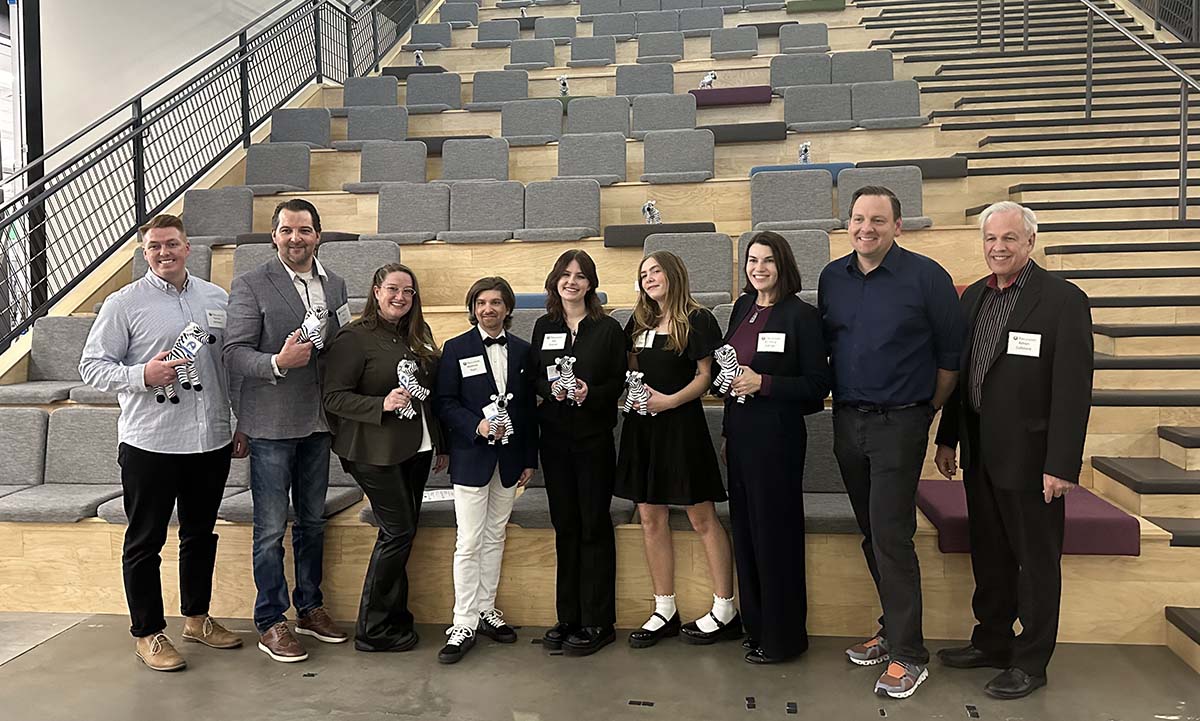
Tracy George, MD (third from right), ARUP’s chief scientific officer and president of the Innovation Business Unit, holds a zebra, the mascot for patients with rare diseases, and poses for a photo with participants in Salt Lake City’s Rare Disease Day event. Pictured, from left to right, are Tanner Withers, parent of a child with a rare disease, Troy Evans, undiagnosed patient with a rare disease, Rebecca Yates, parent of a child with a rare disease, Matt Pearl, patient with a rare disease, Ava and Lucy Szajunk, undiagnosed patients with rare diseases, George, Chris Gibson, PhD, CEO of Recursion, and Kelvyn Cullimore, president and CEO of BioUtah.
Tracy I. George, MD, ARUP Laboratories’ chief scientific officer and president of the Innovation Business Unit, kicked off Salt Lake City’s Rare Disease Day event held on Thursday, February 29, with a message that quality, esoteric tests, like those performed at ARUP, can aid in the diagnostic journeys of people with rare diseases.
“At ARUP, we want to offer a diagnosis to every patient, including those with rare diseases, by offering tests that no one else in the world offers,” George said. “One of those tests is rapid whole genome sequencing (rWGS), which is one of the most comprehensive genetic screening tools available.”
Addressing a group at Recursion, George said rWGS is especially helpful for sick babies because studies show the test can lead to a diagnosis in 40% of infants, resulting in treatments, therapy, and the knowledge of how to care for those infants.
Rare diseases affect one of every 10 Americans, according to the National Organization for Rare Disorders (NORD), and 300 million people worldwide, including Troy Evans, who shared his diagnostic journey Thursday evening.
“Imagine waking up each day and your body is a puzzle that you cannot solve, and doctors just shrug. It is a battle that many people with rare diseases fight in the shadows while they try to appear normal,” Evans said.
His symptoms started at age 21, after a run left him with severe muscle soreness, and eventually additional achiness and muscle atrophy in his legs. Those symptoms led to countless doctor visits and tests. He said it was like fighting an invisible battle when the world around you does not even know you are a soldier. While Evans does not have an answer—yet—he does have hope.
“There is an unwavering determination to keep searching for answers, no matter how long and how difficult,” Evans shared, as his arms and hands shook. During the event, he participated in a panel discussion and began by saying he might start shaking due to his undiagnosed disease. His is the exact type of mystery the healthcare professionals at ARUP want to solve.
“ARUP Laboratories is on the cutting edge of diagnostic innovation, developing treatments with pharmaceutical companies and working toward treatments that are effective or better than anything currently on the market. We are committed to the mission of patient care,” George said. “I’ve had the privilege of working on rare diseases from the bench to the bedside and have participated in clinical trials at ARUP to develop treatments for my rare disease, which is systemic mastocytosis.”
George is an expert in the pathology of systemic mastocytosis, an aggressive disorder that results from excessive activity of mast cells and can lead to a wide variety of symptoms, including anaphylaxis, flushing, and nonspecific GI symptoms, as well as neuropsychiatric complaints.
Thursday’s event brought together the Utah Rare Disease Advisory Council, BioUtah, the Rare and Undiagnosed Network, and dozens of patients, their parents, and people who support them on their rare disease journeys for connection and celebration. Attendees encouraged everyone to #ShowYourStripes in support of those with rare diseases. The zebra is the official mascot for patients with rare diseases.
This was the second annual Rare Disease Day hosted at Recursion and was one of dozens of events held throughout the United States. Rare Disease Day is a global initiative to raise awareness and generate support for everyone who is on a rare medical journey. It takes place on the last day in February, which this year is February 29, the rarest day of the year.
Bonnie Stray, bonnie.stray@aruplab.com
















